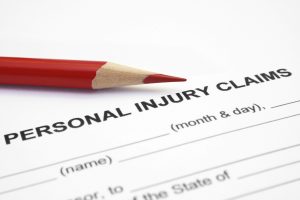 A personal injury case can result in substantial compensation for damages and injuries.
A personal injury case can result in substantial compensation for damages and injuries.
However, each case is unique and even when victims sustain similar injuries, the value of their injury claim may be vastly different.
Therefore, many factors impact how much a personal injury claim is worth.
What is a Personal Injury Claim?

A personal injury claim is a legal cause of action seeking compensation for damages from an injury. Injury claims may arise because of an accident or injury caused by another’s negligence or wrongdoing.
Here are some of the examples of situations that might result in a personal injury lawsuit include:
- Motor vehicle accidents
- Slip and fall accidents (premises liability)
- Pedestrian accidents
- Defective product claims (product liability)
- Bicycle accidents
- Explosions
- Farming accidents and livestock accidents
- Nursing home abuse
- Amusement park injuries
- Workplace injuries
The injured person may be entitled to compensatory damages and punitive damages, depending on the facts of the case. Personal injury lawyers work with accident victims to identify who is liable for their damages. They document damages to maximize the value of the personal injury claim.
What Damages Can I Recover for My Personal Injury Claim?
Damages for a personal injury case fall into one of three categories – economic damages, non-economic damages, and punitive damages. The first two types of damages are compensatory damages. They compensate the victim for losses caused by the accident or the injury.
Economic Losses
Economic damages are financial losses related to a personal injury and include:
- Medical bills and the expenses related to your medical care
- Property damage to personal property, such as vehicle damage caused by a car accident
- The cost of future medical treatment for permanent disabilities and impairments
- Lost wages, benefits, salaries, and other forms of income
- Decreases in future earning potential
The damages award for economic losses can be significant in cases involving injuries that cause disabling conditions. Medical experts and economists might be retained to assist in establishing the extent of your losses.
Careful documentation is necessary to maximize the value of economic damages. You must have proof of each expense or loss to include it in your demand for settlement.
Non-Economic Damages
These damages are related to the suffering and pain you experience because of the accident and your injuries. They are subjective damages because there is no definitive way to measure their value.
Pain and suffering damages include:
- Emotional distress
- Mental trauma and anguish
- Psychological injuries, including depression, PTSD, and anxiety
- Scarring or disfigurement
- Permanent impairments and disabilities
- Decreases in your quality of life or enjoyment of life
Determining a value for non-economic damages can be challenging. Placing a monetary value on a person’s pain is not easy, especially since there is no legal formula for calculating non-economic damages.
A common way to value pain and suffering damages is to use a multiplier. A number is assigned to the case based on several factors. The number is multiplied by the total economic losses. The result is the value of your non-economic damages.
The multiplier is generally between 1.5 and five. The insurance company chooses a low number, while your personal injury attorney fights for the highest number. Catastrophic injuries and permanent disabilities generally increase the value of the multiplier.
Punitive Damages
Punitive damages are not considered compensatory damages. These damages are not intended to compensate the victim for losses. Instead, punitive damages are awarded as a punishment against the defendant for specific conduct.
According to Kentucky Statute §411.184, punitive damages are only awarded if the victim can prove the defendant acted with malice, oppression, or fraud. The evidence must be clear and convincing.
Punitive damages are very rarely awarded in personal injury cases.
Factors That Impact the Value of Your Personal Injury Claim
 Several factors impact how much money you receive for an accident or injury claim. Common factors that impact your case include:
Several factors impact how much money you receive for an accident or injury claim. Common factors that impact your case include:
The Severity of Your Injuries
As stated above, the type and severity of your injuries impact the value of your claim. The more severe the injury, the higher the value of the claim. However, minor injuries are worth pursuing because they can also result in substantial damages.
The Duration of Your Recovery
The length of your recovery can impact the amount of lost wages you incur, the cost of medical care, and the cost of personal care. With each day of your recovery, you incur more losses.
Also, if your pain and suffering damages are calculated based on a per diem, longer recovery periods increase the value of non-economic damages.
A per diem is a daily amount assigned to your claim for your pain and suffering. The per diem is multiplied by the number of days between the injury and when your doctor releases you to calculate the value of your pain and suffering damages.
Comparative Negligence
If you are partially to blame for the cause of your injury or accident, Kentucky’s comparative negligence laws decrease the value of your claim. Your compensation is reduced by the same percentage of fault you have for the cause of the accident.
For example, if you are 40 percent at fault for the cause of a motorcycle crash, you can only recover 60 percent of the value of your damages.
The Strength of Your Evidence
You must prove the elements of negligence to hold the other party legally responsible for your damages. If your evidence proving negligence and fault is weak, the insurance company may offer you a much lower settlement amount. You must then weigh the risks of going to court with a weak case against accepting a lower settlement amount.
The Availability of Insurance Coverage
Liability insurance policies cover accidents and injuries caused by the insured. If insurance coverage applies in your case, the insurance company is liable up to the policy limits if its insured caused your injury.
However, the at-fault party may have minimum insurance coverage for no insurance coverage. In that case, you would need to sue the party for damages. If the person does not have sufficient income or assets to pay the judgment, you could receive nothing for the claim.
Should I Hire a Lexington Personal Injury Lawyer to Handle My Injury Case?
You are not required to hire a lawyer to handle your injury claim. However, you can rest assured that the insurance company has a team of legal professionals protecting its best interest. Hiring a seasoned lawyer to protect your best interests is leveling the playing field.
While you continue to heal from your injuries, your lawyer begins an exhaustive accident investigation to gather evidence proving the other party is at fault. Your attorney also documents your damages to increase the value of your injury claim.
When it is time to settle your case, your attorney aggressively negotiates for the highest amount available, given the facts of your case. If the other party refuses to negotiate a good faith settlement, your attorney can file a personal injury lawsuit before the deadline expires.
Contact Our Kentucky Personal Injury Lawyers for a Free Consultation
Being in an accident can be physically and mentally overwhelming. You need to focus on your recovery instead of a legal case. We are here to help.
If you sustained injuries and damages because of another party’s actions, contact our law firm to schedule a free consultation with a personal injury attorney in Lexington, KY. Get the legal advice you need to protect your best interests and legal right to a fair settlement amount.
Minner Vines Injury Lawyers, PLLC – Lexington, KY Office
325 W Main St #210, Lexington, KY 40507
(859) 550-2900
Minner Vines Injury Lawyers, PLLC -Bowling Green, KY Office
814 State St. suite 100, Bowling Green, KY, 42101
(270) 517-2014
Minner Vines Injury Lawyers, PLLC – Nashville Office
49 Music Square W #504, Nashville, TN 37203
(615) 676-7060